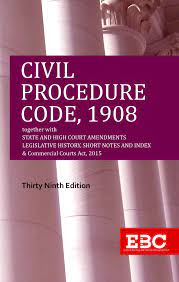
Code of Civil Procedure, 1908 (CPC)

20.12.2023
Code of Civil Procedure, 1908 (CPC) , Daily Current Affairs , RACE IAS : Best IAS Coaching in Lucknow
|
For Prelims:What remedies against ex parte decree were explained by the Court in the case of Kaushik Mutually Aided Cooperative Housing Society vs. Amina Begum, Important points,Revision petition under section 115 of the Code of Civil Procedure, 1908 For Mains paper:Who can apply for revisional jurisdiction,What are the conditions for revisional jurisdiction,What is ex parte decree |
Why in the news?
Recently the Supreme Court held that a civil revision petition under Section 115 of the Code of Civil Procedure, 1908 (CPC) against dismissing an application for quashing of an ex parte decree has jurisdiction under Order IX Rule 13 of the CPC.
Important points:
- Supreme Court Justice B.V. The bench comprising Justice Nagarathna and Justice Ujjwal Bhuyan stated that, when there is an express provision available under the CPC or any statute under which an appeal is maintainable, it is set aside.
- This view was given by the Supreme Court in the case of Kaushik Mutually Aided Cooperative Housing Society vs. Amina Begum.
What remedies against ex parte decree were explained by the Court in the case of Kaushik Mutually Aided Cooperative Housing Society vs. Amina Begum:
- The Supreme Court pointed out that against an ex parte order, the defendant has three remedies available.
- First: Quashing of an ex parte decree can be sought by filing an application under Order IX Rule 13 CPC.
- Second: Filing of appeal against ex parte decree under Section 96(2) of CPC.
- Third: Relief can be sought against an ex parte decree by way of review before the same court.
Revision petition under section 115 of the Code of Civil Procedure, 1908:
- Revision is doing any work carefully, completely and diligently.
- The High Court has revisional jurisdiction as per Section 115 of the Code of Civil Procedure.
- To guarantee the delivery of justice and maintain impartiality, the High Court has the authority to review decisions made by lower courts.
Who can apply for revisional jurisdiction:
- After any case has been decided an application for revision may be filed by any aggrieved party provided there is no present appeal against the case.
- The High Court may then decide to modify the case if proper cause is discovered such as extra-judicial activity or illegal and erroneous procedure adopted by the subordinate court.
- The High Court can also exercise suo motu revisional jurisdiction under the Code of Civil Procedure.
- In the case of S.Muthu Narayanan vs. Paulraj Naicker, 2018, the revision petition is dismissed and the order passed earlier is confirmed as the revision petitioner has no right to challenge the execution of the decree.
What are the conditions for revisional jurisdiction:
- The conditions upon which the High Court may exercise its revisional jurisdiction are laid down in Section 115 of the Code of Civil Procedure.
- All these conditions have to be fulfilled for the High Court to exercise its revisional jurisdiction. Which are as follows:
- There should be no appeal pending against the decision of the lower court. If there is an existing appeal against the case, the High Court cannot modify it, and vice versa. Revision can be filed only after the appeal is rejected.
- Jurisdictional error occurs when it appears to the subordinate court that it exceeded the jurisdiction conferred by law, or failed to exercise the jurisdiction conferred by law, or displayed grave irregularity and exercised its power unlawfully or in accordance with the requirements violation of law.
- The High Court cannot exercise revisional jurisdiction unless a case has been decided by a court subordinate to the High Court.
- The power of revisional jurisdiction and its exercise is at the discretion of the High Court and cannot be claimed as a matter of right by any aggrieved party. Before exercising the right of revisional jurisdiction, several considerations are examined.
- If there is no effective or other remedy available to the aggrieved party, the court may refuse to exercise its revisional power and instead provide alternative remedies and relief to the aggrieved party.
- In the case of Rahimal Bathu vs. Ashiyal Biwi, Civil Appeal No. 2023 (arising from SLP(C) No. 8428 of 2018), the Supreme Court ruled that a revision petition filed under Section 115 of the Code of Civil Procedure, 1908 by a Subordinate Court The review application of an appealable order cannot be heard if it is rejected on merits.
What is ex parte decree:
- Every party has the right to a fair hearing.
- If a party does not appear on the scheduled date, the court issues a notice to him through summons to appear.
- If in a civil suit, the plaintiff is present and the defendant is not present even though the court has issued summons to him in this regard, then the court can pass an ex-parte decree or order against the defendant.
- The court has the power to pass an ex parte decree under Order 9 Rule 6 of the Code of Civil Procedure, 1908.
- When an ex parte decree is passed against the defendant he can use various means to get it quashed.
- An ex-parte decree is a final order, after which there is no point for the defendant to appear in future.
- Unless he shows good cause for his absence, or is dismissed on appeal.
Source: Down to earth